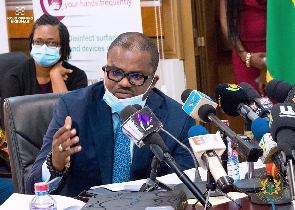 Charles Adu-Boahen, President's representative at the Finance Ministry
Charles Adu-Boahen, President's representative at the Finance Ministry
The President’s representative at the Ministry of Finance, Charles Adu-Boahen, has justified the imposition of the five percent financial sector clean-up levy on banks’ pre-tax profits – arguing that existing banks benefitted from the government’s costly intervention in the sector.
“It is important to remind the banking sector that they are where they are today and more profitable and stronger because of the steps we took in 2017 to clean up the sector. There was a systemic risk element at play.
If we hadn’t stepped in and the first bank had collapsed, it would have created a run on all the other banks, and most of the banks standing today would have been faced with a very dire situation,” Mr. Adu-Boahen said.
The President’s representative, who is widely expected to be renominated to the position of Deputy Finance Minister, was speaking during audit firm PwC’s 2021 post-budget forum held virtually.
In his view, the disquiet that greeted the levy’s announcement – although expected – does not take cognisance of government’s efforts to make the banking sector profitable.
The levy, which was announced in last Friday’s budget statement, is expected to generate about GH¢290m this year. This, according to Mr. Adu-Boahen, is a small fraction of the GH¢21bn the government incurred to clean up the sector.
Despite the former deputy finance minister reiterating government’s promise of reviewing the levy in 2024, George Kwatia, a Tax Partner at PwC, maintained that it is likely the levy has come to stay.
He cited the five percent National Fiscal Stabilisation Levy on banks’ pre-tax profits, which was first introduced in 2009 and was supposed to be a short-term measure but has since been extended over the years.
2021 Budget
The Senior Country Partner of PwC, Vish Ashiagbor, commended the Ministry for a budget that seeks to build on the marginal growth achieved last year amidst the pandemic.
According to the budget statement, the country’s economy is estimated to have grown at a rate of 0.9 percent in 2020 – a development Mr. Ashiagbor said demonstrates government’s efforts to prevent the economy from sinking into recession as was the case in most countries.
The Senior Country Partner said government’s growth target of five percent for 2021 appears feasible if the progress made despite the pandemic last year is consolidated.